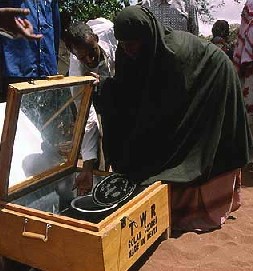|
afrol News, 9 January - The Dadaab complex of refugee camps is slowly winning the battle against the harmful environmental impact so typical of refugee camps. Large concentrations of impoverished refugees normally lead to deforestation due to the need for fuel wood. In Dadaab, refugees plant trees and vegetable gardens and use new and old technology for "green cooking." 24-year-old Adey Hillow, a Kenyan of Somali origin who lives just outside the Dadaab camps, run by the UN refugee agency UNHCR, has been using a solar cooker for almost a year under a pilot project in and around the camps run by the German aid agency, GTZ (Deutsche Gesellschaft für Technische Zusammenarbeit). The solar cookers are part of GTZ's efforts to minimise and even reverse environmental degradation, a priority of UNHCR for the last decade – because huge influxes of refugees can wreak ecological havoc, and also because people may become refugees when their environment becomes exhausted, the UN refugee agency reports from Kenya. Ms Hillow received one of about 190 solar cookers distributed last year to refugees and local residents around Dadaab in north-eastern Kenya as a reward for planting and successfully nurturing 10 seedlings near each of their homes.
- The solar cooker works well, Ms Hillow told Kitty McKinsey from the UNCHR office in Nairobi. "I can cook rice, meat, almost any food in it. I would recommend it to other women." The cooker works like a greenhouse, absorbing light rays on black surfaces, transforming the light into heat and storing it effectively. About the size of a small suitcase, the cooker is made of wood lined with tin, Ms McKinsey from UNHCR explains. A black metal pot containing the food is placed inside, on top of small uniform strips of wood to help ensure even heat distribution. A clear glass top is lowered and locked; temperatures inside can rise to 160° Celsius. Cooking time is longer than with an open fire, but Ms Hillow does not see this as a disadvantage. "In the morning, you set your food in, lock it and leave it for a few hours, then it's ready," she told UNHCR, adding that it frees her to do other work in the interval. A bonus is that the cooker cuts down the use of precious water. - These stoves have become prestige items among the refugees and local residents, says Abdi Mohammed, field programme co-ordinator for GTZ in Dadaab. That sometimes means families are keener to acquire the stoves than to actually use them, but Mohammed told UNCHR usage was increasing as well. "They are starting to understand it's a way to save money," he adds. For refugees especially, "firewood is really a scarce commodity, so they can use this cooker instead of going out to collect firewood or selling some of their rations" to buy firewood. UNHCR provides refugees with dead wood collected outside the camps. This firewood is intended to last each family half a month, limiting their uncontrolled collection and possible conflict with local residents. With as many as 20-24 days of sunshine a month in the Dadaab area, the solar cookers can be a valuable replacement for firewood for many lunches when the sun is high overhead. Ahmed Sheikh, UNHCR's environmental officer in Dadaab, says the stoves could provide as much as 20 percent of a family's energy needs in a month. In addition to the solar cookers, GTZ is experimenting with a variety of energy-efficient stone and clay stoves based on traditional designs, Ms McKinsey reports from Nairobi. The German NGO holds impressive demonstrations to show refugees that one of these stoves can cook just as well with only two kilograms of firewood as does an open fire consuming five kilograms of wood. GTZ is also encouraging refugees and local residents to plant seedlings grown in a local nursery. The UN refugee agency and its partners have not only planted 400 hectares of greenbelt in Dadaab, they have also educated refugees and locals on the value of conservation and tree planting. "We educate refugees on the benefits of the trees as windbreaks and shade, as well as shelter and building material after three or four years," says GTZ's Mohammed. Sheikh agrees that "it's important for UNHCR to take some measures to replenish the resources that are used and depleted by the refugees". Both the firewood project and the planting of seedlings had helped improve relations between the local community and refugees, UNHCR reports. "The local community has become more friendly to the refugees because they see that the environment is not being degraded," says Mohammed. "The conflicts that used to exist between refugees and the local community have substantially subsided." In yet one more effort to increase the greenery in refugee camps (as well as provide a more varied diet), GTZ is encouraging refugees to grow multi-tiered gardens using nothing more complicated than recycled burlap bags, old tin cans, stones and waste water. Packed with only a small amount of soil, these vertical gardens can grow several levels of vegetables that provide valuable micro-nutrients.
Sources: Based on UNHCR
|
front page
| news
| countries
| archive
| currencies
| news alerts login
| about afrol News
| contact
| advertise
| español
©
afrol News.
Reproducing or buying afrol News' articles.
You can contact us at mail@afrol.com

